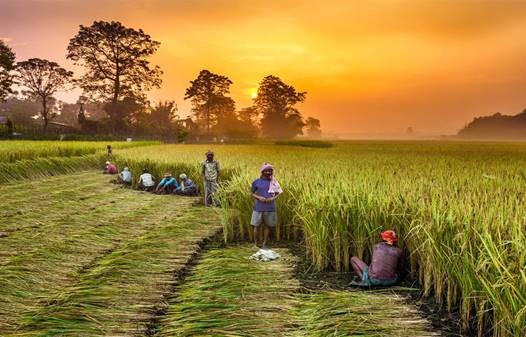Intellecap and Transform Rural India Foundation launch “India Agriculture and Food Systems – Circularity Action Platform” (IAFS-CAP) to promote circularity in production, processing and distribution of agriculture products in India

Intellecap and Transform Rural India Foundation launch “India Agriculture and Food Systems – Circularity Action Platform” (IAFS-CAP) to promote circularity in production, processing and distribution of agriculture products in India

Mumbai 12th February – In their quest to solve problems for the smallholder farmers, businesses and consumers, Intellecap and Transform Rural India Foundation today announced the launch of IAFS-CAP to promote circularity in production, processing and distribution of agriculture products (food, fibre and fuels). As part of this initiative, they are looking to operationalize 6-7 projects across the country impacting 1,00,000 farmers, several businesses and consumers while scaling at least 3 innovations in technology and business models within three years in the circularity space in agriculture and food sectors.
The system of circularity in agriculture is based on four basic principles – arable land should be used primarily to produce plant biomass for human consumption; by-products from food production, processing and consumption should be recycled back in the food system; adoption of the principles of regenerative agriculture and finally promoting consumption at low trophic levels.
The platform will operationalize challenge funds for surfacing circular technologies and business models, help them achieve proof of concept, curate pilots and scale them to help further the circularity agenda in agriculture and food sector in India. Further, the platform will enable farmer collectives and contract farming enterprises to access technology, philanthropic capital and premium markets. It will also enable sector stakeholders to curate partnerships to ensure that adequate quantities of agricultural produce, bearing the right quality specifications, are made available to processors, exporters, organized retail and e-commerce platforms in a timely manner. Additionally, the platform will also be capable of undertaking deep research and advocacy to identify best practices, ecosystem gaps and ways to stimulate demand for circular food in the country.
Speaking on the launch of this initiative, Mr. Anish Kumar of Transforming Rural India Foundation said, “TRIF is wedded to the idea of adoption of circular practices in production of food while ensuring a sustainable increase in smallholders’ incomes and helping the consumer access safe food in a manner that is friendly to our planet.”
Mr. Santosh Kumar Singh, Director, Intellecap said, “Agriculture has been one of the core focus areas for Intellecap since its inception. Given the need for closing the loops for materials and substances in agriculture and food sector, which includes reducing food loss and waste, this platform will help in making the agriculture and food systems in the country circular while increasing the incomes and resilience of the smallholder farmers, helping the businesses achieve triple bottom lines and consumers access safe and healthy foods and maintaining sustainability of our food and agriculture systems.”
Despite bringing with it several economic and environmental advantages, circularity in agriculture has failed to spread its wings in India. Limited awareness of the benefits of practicing circularity in agriculture among farmers and consumers, fragmented innovation ecosystems, and a weak and deeply flawed positioning of circularity among farmers are some of the roadblocks hampering the adoption of circularity in agriculture. Intellecap-Transform Rural India Foundation (TRIF) partnership has devised a four pronged strategy to mitigate these challenges and realize a self-sustaining circularity ecosystem in India: (i) Identifying the ecosystem gaps which exist (finance, policy, consumer awareness, etc.);(ii) bridging these gaps through collaborations; (iii) Improving the economies and business case for circular agriculture through value addition and certification; (iv) Catalyzing on-ground action to support test bedding, piloting and scaling of identified innovations.
With 30% of land in India degraded, 25% of the water which is used for producing food wasted, and farmers losing over US$ 12 billion as post-harvest losses makes adoption of circular practices in agriculture is extremely important. According to research conducted by ICAR, 85.5 megatons of carbon emissions could be reduced in India by simply adopting practices like those followed in circular agriculture. Further, Ellen MacArthur Foundation estimates that practicing circularity in agriculture could lead to an annual economic benefit of US$ 61 billion in India by 2050.
View full article



